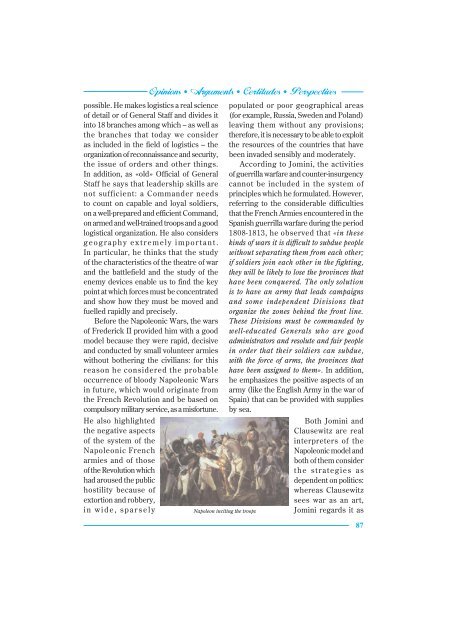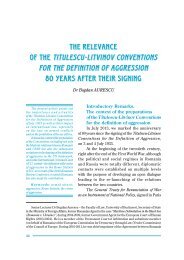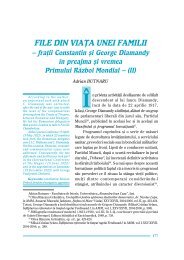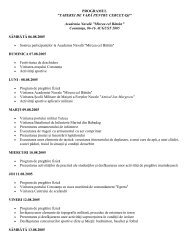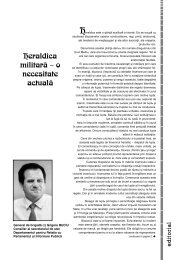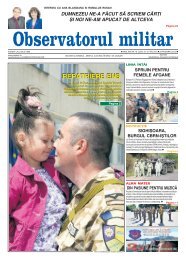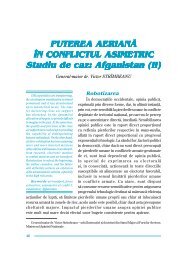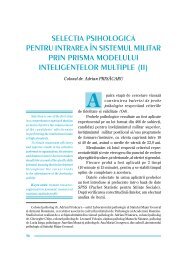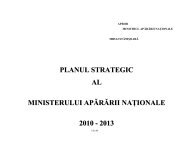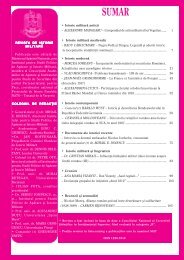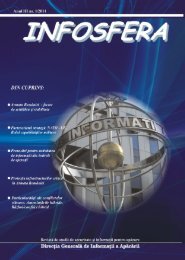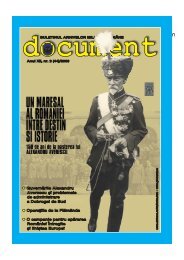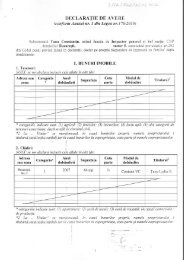Romanian Military Thinking
Romanian Military Thinking
Romanian Military Thinking
Create successful ePaper yourself
Turn your PDF publications into a flip-book with our unique Google optimized e-Paper software.
Opinions • Arguments • Certitudes • Perspectives<br />
possible. He makes logistics a real science<br />
of detail or of General Staff and divides it<br />
into 18 branches among which – as well as<br />
the branches that today we consider<br />
as included in the field of logistics – the<br />
organization of reconnaissance and security,<br />
the issue of orders and other things.<br />
In addition, as «old» Official of General<br />
Staff he says that leadership skills are<br />
not sufficient: a Commander needs<br />
to count on capable and loyal soldiers,<br />
on a well-prepared and efficient Command,<br />
on armed and well-trained troops and a good<br />
logistical organization. He also considers<br />
geography extremely important.<br />
In particular, he thinks that the study<br />
of the characteristics of the theatre of war<br />
and the battlefield and the study of the<br />
enemy devices enable us to find the key<br />
point at which forces must be concentrated<br />
and show how they must be moved and<br />
fuelled rapidly and precisely.<br />
Before the Napoleonic Wars, the wars<br />
of Frederick II provided him with a good<br />
model because they were rapid, decisive<br />
and conducted by small volunteer armies<br />
without bothering the civilians: for this<br />
reason he considered the probable<br />
occurrence of bloody Napoleonic Wars<br />
in future, which would originate from<br />
the French Revolution and be based on<br />
compulsory military service, as a misfortune.<br />
He also highlighted<br />
the negative aspects<br />
of the system of the<br />
Napoleonic French<br />
armies and of those<br />
of the Revolution which<br />
had aroused the public<br />
hostility because of<br />
extortion and robbery,<br />
in wide, sparsely<br />
Napoleon inciting the troops<br />
populated or poor geographical areas<br />
(for example, Russia, Sweden and Poland)<br />
leaving them without any provisions;<br />
therefore, it is necessary to be able to exploit<br />
the resources of the countries that have<br />
been invaded sensibly and moderately.<br />
According to Jomini, the activities<br />
of guerrilla warfare and counter-insurgency<br />
cannot be included in the system of<br />
principles which he formulated. However,<br />
referring to the considerable difficulties<br />
that the French Armies encountered in the<br />
Spanish guerrilla warfare during the period<br />
1808-1813, he observed that «in these<br />
kinds of wars it is difficult to subdue people<br />
without separating them from each other;<br />
if soldiers join each other in the fighting,<br />
they will be likely to lose the provinces that<br />
have been conquered. The only solution<br />
is to have an army that leads campaigns<br />
and some independent Divisions that<br />
organize the zones behind the front line.<br />
These Divisions must be commanded by<br />
well-educated Generals who are good<br />
administrators and resolute and fair people<br />
in order that their soldiers can subdue,<br />
with the force of arms, the provinces that<br />
have been assigned to them». In addition,<br />
he emphasizes the positive aspects of an<br />
army (like the English Army in the war of<br />
Spain) that can be provided with supplies<br />
by sea.<br />
Both Jomini and<br />
Clausewitz are real<br />
interpreters of the<br />
Napoleonic model and<br />
both of them consider<br />
the strategies as<br />
dependent on politics:<br />
whereas Clausewitz<br />
sees war as an art,<br />
Jomini regards it as<br />
87


